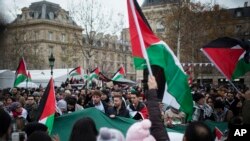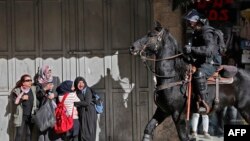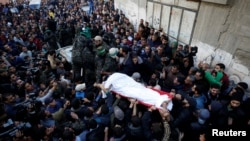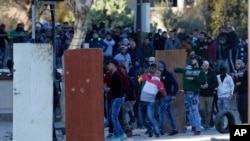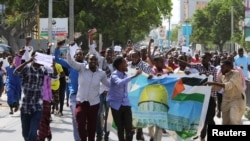Al-Qaida is seeking to to exploit Muslim anger over President Donald Trump’s decision to recognize Jerusalem as the capital of Israel and to present itself as the true defender of Islam and the Palestinians.
The jihadist group posted Saturday a 17-minute audio message from Osama bin Laden son’s, Hamza, in which he lambasts Saudi Arabia’s royal family, accusing the House of Saud of betraying the cause of Palestine.
Analysts suspect the audio message was recorded by Hamza, who’s been dubbed by the media the ‘Crown Prince of Terror,” before Trump’s midweek announcement, in which the U.S. leader said his administration would start the process of moving the American embassy from Tel Aviv to Jerusalem.
His message — the third in a series of three inciting violence against the Saudi establishment — makes no mention of Trump’s decision, but the timing of its release appears to be a bid to capitalize on it, according to the Middle East Media Research Institute, a U.S. research group that monitors jihadist online activity.
Hamza bin Laden, who analysts say is likely being groomed eventually to lead al-Qaida, claims in the audio message that the Saudi royal family has betrayed the Palestinians since the Ottoman era.
In 2014, Hamza was reportedly directing al-Qaida's Syria-based Khorasan Group. He lived in Iran for many years along with other family members after fleeing Afghanistan in the wake of the 9/11 terror attacks on New York and Washington.
The timing of the release of his message may have been prompted by criticism of al-Qaida by its rival the Islamic State.
While condemning Trump’s decision to reverse long-standing U.S. policy on Jerusalem, IS also took aim at its jihadist competitor and other militants as well as Arab leaders, sneering at them for having done little to back the Palestinians and for using Palestine to suit their own purposes.
In an editorial in the Islamic State’s weekly online newspaper, the group complained of the hypocrisy of rivals, charging, “Sixty years [have passed] and Al-Quds has been in the Jews' hands, and then people are crying the moment the Crusaders declared it today a capital for them [i.e. for the Jews].”
IS claimed to be the true guardian of Jerusalem and the city’s Al Aqsa Mosque.
Palestine and Israel’s occupation of the West Bank and Gaza have been key themes of jihadist narratives going back to Hamza’s father, Osama bin Laden. Al-Qaida’s central leadership invoked the group’s founder in its initial statement condemning Trump, quoting him as saying once, “I swear by Allah, America and those who live in America shall never even dream of peace until we experience it as a reality in Palestine.”
In response to Trump’s decision to recognize Jerusalem as Israel’s capital, al-Qaida leaders declared: “The surest and shortest way to confront the aggression and arrogance of America, the Pharaoh of this age, is through Jihad.”
Previous U.S. administrations have declined to honor a 1995 vote in Congress to move the embassy to Jerusalem for fear both of undermining Mideast peace negotiations and of playing into the hands of militants.
Last week, when urging the Trump administration against reversing U.S. policy, Jordan’s King Abdullah warned that moving the U.S. Embassy from Tel Aviv to Jerusalem would provoke extremists and cause anguish across the already volatile Middle East.
During a meeting with U.S. congressmen, the Jordanian monarch warned the decision would be exploited by terrorists and used “to stoke anger, frustration and despair to spread their ideologies.” Jordanian intelligence officials say they warned their American counterparts that by recognizing Jerusalem, hostility against the U.S. would increase, making it harder for Jordan and other moderate Arab governments to cooperate openly with America.
In the wake of Trump’s decision, Palestinian militants have threatened to target U.S. “interests and installations throughout our occupied land.”Al-Qaida affiliates have been quick to fan the flames of Muslim anger.
The spokesman of Somalia-based Harakat Al-Shabab Al-Mujahideen urged Muslims to take up weapons and conquer Jerusalem by force. Al-Qaida in the Arabian Peninsula said Jerusalem was not Trump’s property to sell to "the Jews,” and it vowed to provide Palestinians with any support they require.
“Bin Laden’s outfit has long sought to tie the Israeli-Palestinian conflict to its mission, even though the group has had little to do with it,” argues Thomas Joscelyn, an analyst at the Foundation for Defense of Democracies, a Washington-based think tank. Writing in the "Long War Journal," he cautioned, “That could change in the future.”




